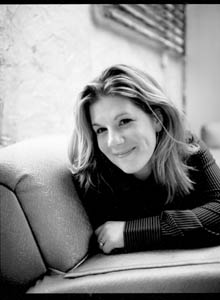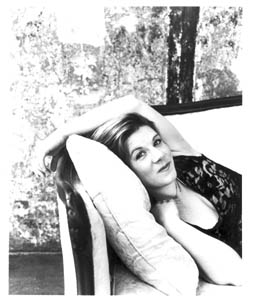![[Metroactive Music]](/gifs/music468.gif)
[ Music Index | Santa Cruz | Metroactive Home | Archives ]
As cool as she is, Dar Williams has had plenty of growing pains as her career has exploded. Now, on the heels of her new album 'The Beauty of the Rain,' she takes her act back to the town that--for one small but perhaps critical moment several years ago--played a role in her success.
By Steve Palopoli
Some musicians claim to be unaffected by critical evaluation of their music. Dar Williams has no such pretentions--if anything, she takes it to the opposite extreme. "I wanted to write something for a dance performance for my friend once," says Williams. "And I had all these ideas for it, and I sang about two bars for another friend. She looked at me and said, 'Philip Glass much?' And I never pursued it. I never pursued the themes, I never pursued the melodies. I never pursued a single thing about it. Every time I started to do it, I heard some critic going, 'Philip Glass much?'"
If you can appreciate that one of the most acclaimed and successful indie singer/songwriters of the last 10 years can be stopped dead in her tracks by the threat of an unlikely comparison to Philip Glass, you can understand why this native East Coaster feels a certain amount of gratitude toward Santa Cruz. It seems that it was at one of her shows here several years ago that she submitted for the audience's approval an unfinished "As Cool As I Am," which would go on to be her most popular song and the lead track on her bestselling Mortal City album.
"I played it at the Kuumbwa when I'd only written a verse and chorus. I said, 'This is a new strumming pattern, this is a new theme, this is a new style, what do you think?' And everyone said, 'Write it! Write it!' People came up afterwards and said, 'Absolutely write it,'" remembers Williams.
OK, so she's not that easily intimidated. In fact, her wispy looks and soft-spokenness onstage belie the fact that Williams, who returns to the Rio for a show May 16, has done an incredible job of shaping her own career, managing an indie record contract that gives her artistic and financial freedom while steadily expanding her fan base and mainstream exposure (her profile in last November's Vanity Fair is just the most recent example) over the course of six albums. Still, she recognizes that the Santa Cruz unveiling was a landmark moment.
"You have to have your own engine when you're doing stuff. I have songs about potheads and bars and feminism and Southern California, and you have to kind of say, 'Well, I'll write it for me if no one else.' I have to finish it before I know if it's worth it, and usually I can keep it under my hat," she says. "But everyone was being so cool, and I said, 'Look, this is the thing and I feel really weird about it because it's such a step out for me.' And the feedback I got was so supportive."
Well, we're all about good vibrations here in Santa Cruz, aren't we? Of course, some of us get a little antsy when our underground feminist musical heroes start getting successful, and that's why not all of her longtime fans are going to relish hearing about Williams' aforementioned attention from the mainstream, or, hell, even seeing her on the cover of Metro Santa Cruz.
Every fiercely loyal fan base goes through growing pains when their object of affection grows from album to album, but Williams has an uncanny knack for bringing her fans along with her.
"I think as long as they know it's me at the bottom of all this, then it's OK. As long as I'm the common denominator of all this material, and it looks like it's what I wanted to do, they're cool about it," she says. "I remember being a fan, and I, too, just wanted to make sure that the choices were the artist's choices, and not the artist getting taken for a ride by somebody else. Luckily, the contract I have with my label, the management that I have, the people that I like to work with are not bullies. None of them are bullies. The net result is always something where I feel like I'm in the mix. And I'm guessing that people can tell that."
Sound and Vision
Perhaps the hardest thing for some fans to adjust to has been the increasingly pop production of Williams' work. Singer/songwriter audiences of the folk-rock variety tend to equate a rawer sound with authenticity, and this often creates a fascinating conflict, since every artist is, in contrast, learning how to make more technically accomplished albums with each new foray into the studio. Some musicians get frustrated and try desperately to get "back to their roots." (As Lou Reed famously put it, "I don't like Lou Reed records.") Williams, on the other hand, has pushed ahead, and her latest album, The Beauty of the Rain, features her glossiest production yet.
"I think [fans] really get queasy when it comes to lyrics and intention, more than production. So I kind of feel like it's much ado about nothing when people quibble about the production," says Williams. "But at the same time, it probably has gotten more lush. That's what I love. I love beautiful production--I love Brian Eno and I love Jon Brion's production, and so the opportunity to take it in that direction is always really attractive to me. As is the opportunity to sing harmony, which I love to do so much, and which, one could argue, is more associated with lush pop production. Every time we sit down to make an album, all I say when people say, 'What would you like this to sound like?' is that I want it to be beautiful, and probably in a pretty feminine way."
To look back over past reviews of Williams' work can be pretty amusing, as some critics have expressed their trepidation with a brand-new album in one review, only to say upon the release of the next album that "the last album was brilliant, but I'm not sure about this one ..."
"A lot of people say 'Eww' at first, and then they say, 'Actually, her last album was really good,'" Williams acknowledges. "But I'm surprised at how often I encounter people saying, 'This album's really good. Thank God she got past that phase she was in on the last album."
And Williams has indeed gotten past something on this new album, though she suggests it's as much in her psyche as in her work.
"I see my own personal growth in the last 10 years more than I see the growth of my songwriting," she says. "I thought I had to work very hard to be a good person, that I could always change, that I always had to try to change. I still have some of that desire to improve and stuff, but I also have this very adult acceptance of what you can't change or shouldn't even try to change. So with this album, specifically, I remember playing all these demos for my husband, and he said, 'These are great. I think this is going to be your best album yet.' And I said, 'No, I give up. They're easier paced, they're easier in their themes, they're not aspiring to stack up themes--they're really just kind of about one thing.' And he said, 'Yeah, I think it's going to be your best album yet.'"
The axis around which all of this growth, anxiety, confidence, resistance and acceptance turns is Williams' songwriting. From early favorites like "When I Was A Boy" to songs like "The Ocean" and "The Christians and the Pagans" that really solidified her popularity, right up to recent stand-outs like "I Won't Be Your Yoko Ono," Williams' writing has connected with audiences in a unique way. Artistically ambitious without being pretentious, clever and funny without trying too hard, these are songs that offer up substantial and emotional songcraft with organic effortlessness. Songs like "Mercy of the Fallen" and "Closer to Me" off the new album succeed in the same way, which is kind of important when you want to introduce new songs to an audience often squirming to hear their old favorites.
"I find it has been pretty easy on the last two albums, because there's stuff that really just makes itself available to an audience right off the bat," says Williams. "I find that there are a lot of approachable, almost soothing songs on this album, and that that really gives it some momentum to ramp into or out of the old stuff."
That has made, she says, for shows on this tour that are a half-and-half mix of new and old material, though she's been digging into her catalog for what she refers to as "some real B-side stuff" for these sets.
"There's a few favorites, a lot of new and then some of this kind of funky, not-as-requested stuff. I actually went back and listened to my albums--which is very hard to do--and found that the ones that were standing out were not necessarily [the most-requested songs]. So I tried to give them a new life," she says.
As for her new songs, Williams thinks something like "Fishing in the Morning," about two friends on a fishing trip, is a good example of how she's matured as a songwriter.
"I feel like that song is me kind of putting my hand on his arm and saying, 'Hey, I adore you.' As opposed to doing a big treatment about what friendship is like, or how incredibly hard it is to sustain friendships," she says. "It's just a moment in the day."
Williams came up as one of a generation of singer/songwriters firmly grounded in their native geography. (In Williams' case, she was born in New York state, but raised in New England.) Her roots can still be heard on The Beauty of the Rain, though of course her worldview has expanded significantly after years of touring. Perhaps one of the reasons Williams has become so popular in Santa Cruz is that she is connected to this place not just by the "As Cool As I Am" greenlighting incident, but by the landscape of her song "The Ocean," which seems in many ways to be about Santa Cruz. Williams acknowledges that the song refers to the Pacific Ocean rather than the Atlantic of her native territory.
"I find my traveling life informs a lot of my lyrics in terms of the metaphors I use," says Williams. "But having lived deep in New England as I did, really in farm country with all the maple trees, the farms, the rivers and all that, I think that people are actually consoled when they hear someone singing deeply and knowledgeably about where they're from. I'll come sing about where I'm from, and then Cheryl Wheeler, who lives on the Cape, will sing about that landscape. And then Greg Brown will talk about Iowa. And everybody will sort of bring a different thing to the party. I think people really like that, and it gives people a sense that music is alive and diverse."
[ Santa Cruz | Metroactive Central | Archives ]
Copyright © Metro Publishing Inc. Maintained by Boulevards New Media.
![]()

What Do You Hear in These Sounds?

Playing Hooky
Dar Williams performs Friday, May 16 at the Rio Theatre, 1205 Soquel Ave., Santa Cruz. Tickets $25 advance, $30 door, available at Herland, Bookloft and the Santa Cruz Civic box office.
From the May 7-14, 2003 issue of Metro Santa Cruz.